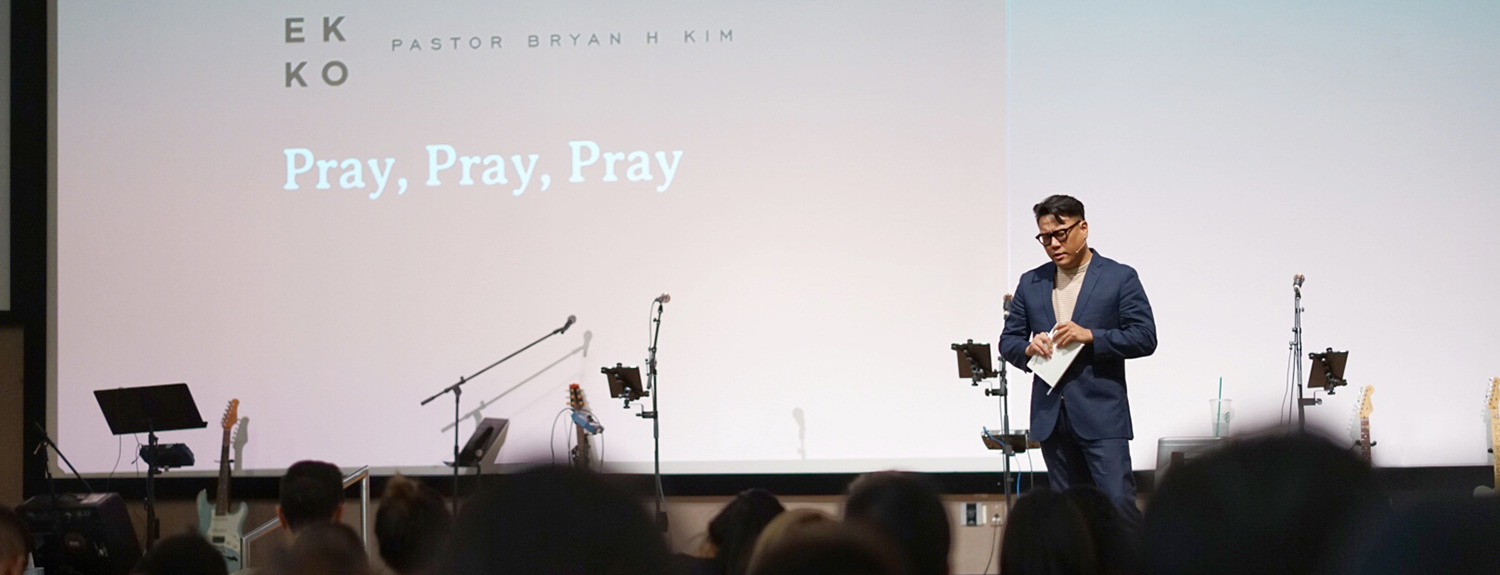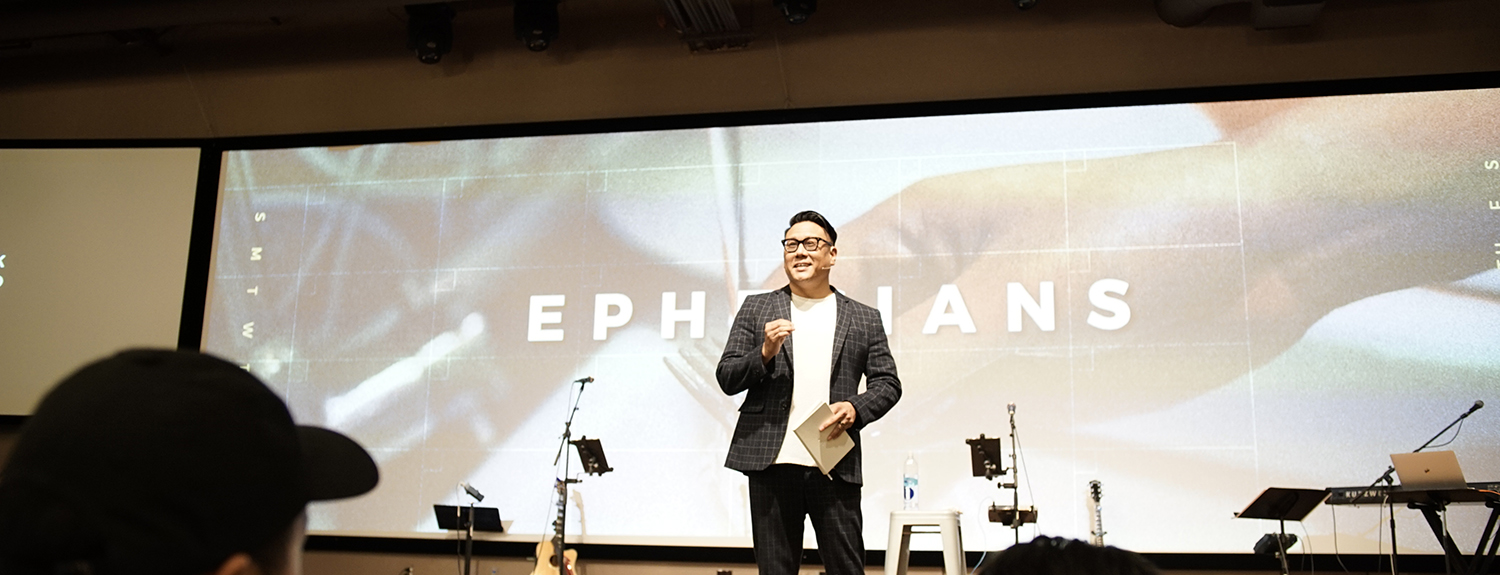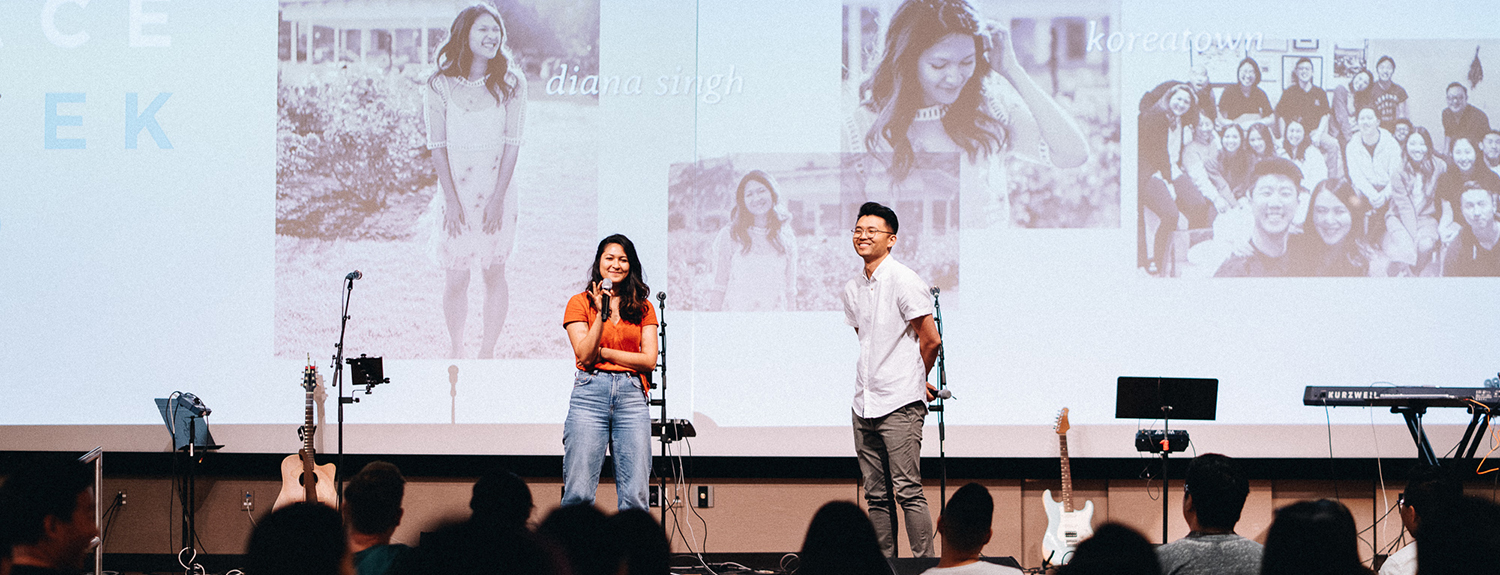SYNC 10 Session I: Hearing the Voice of God
Pray, Pray, Pray
Pray, Pray, Pray
Have you ever tried to run a long distance with all the right gear, but without the proper training? No matter how much support your shoes provide or the type of clothes that you wear, only proper and consistent training can expand your lungs and heart to stay in the race.
This is much like our faith life.
We may have the Armor of God, but without proper conditioning, we lack the breath and the persistence in order to stay in the fight.
Prayer is life-giving; it’s breathing in the breath of God.
Prayer employs and empowers the Armor of God. Hence, in order to stand firm, be strong and resist the evil one, we must learn to pray.
Apostle Paul in Ephesians writes that we should pray all the time.
“Pray in the Spirit at all times and on every occasion. Stay alert and be persistent in your prayers for all believers everywhere.”
— Ephesians 6:18
This might seem daunting, but according to a recent study, the average American sends roughly 100 messages a day. We have no problem staying connected to people—it’s simply a matter of whether we want to.
When do we pray?
The chart below is an example of how we can pray all day.
Between meals, the daily offices or prayer times, we can be worshipping or praying in tongues.
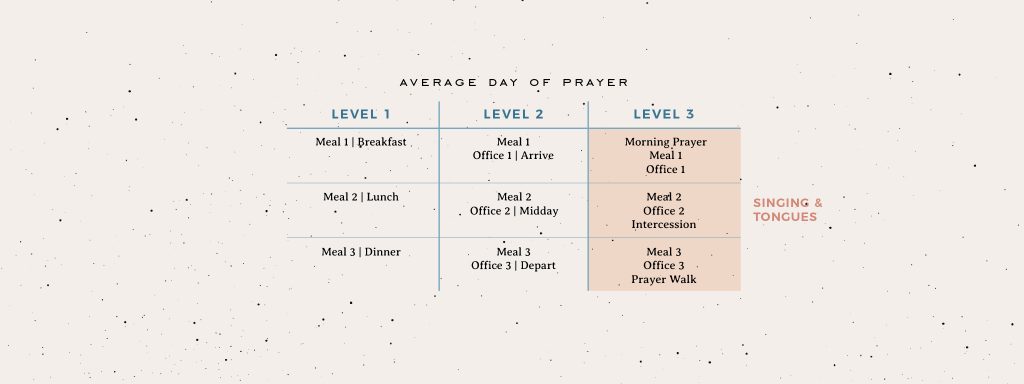
Who do we pray for?

And as we pray all the time, we pray for “all the saints.”
We learn to pray for ourselves, our tribe and our nation, and the world. But we also need to pray for our leaders and our pastors.
Even Apostle Paul, arguably one of the greatest apostles of all time, humbly asked for prayer when he said, “… pray also for me.”
When we pray, we pray for these three things:
- To be Awake | To see and live in God
- To be Alive | To hear and respond to God
- To be Ambassadors | To preach the gospel of Jesus Christ effectively
It takes practice and intention to build this discipline of prayer. Just like it takes time to train for a marathon. It doesn’t happen overnight. If you find it difficult to pray, try worshipping first.
Worship Prayer reminds us that God is good, just and holy.
“When we come into the presence of God in prayer, something leads us to worship, and it seems worshipping God automatically moves us to pray.”
— Dr. Mary Kate Morse
Worshipping God bends us toward Him in prayer and vice versa. Let’s be known as a body that prays constantly.
You can listen to the sermon Pray, Pray, Pray from the Ephesians series that inspired this post here.
All images and materials are copyright protected and are the property of EKKO Church unless otherwise noted and credited to their maker. Please do not copy or distribute without permission.
See below for a list of prayers we’ve written for the body.
Drawing Near to God Prayer Book (PDF)
Prayers you can listen to:
Resources to help you pray:
24 different types of prayer outlined by Dr. Morse from her book, A Guidebook to Prayer: 24 Ways to Walk with God
Armor of God
In our Ephesians series, we took a deep dive into the Armor of God in Ephesians 6:10-20. In this verse, Paul reminds us that we are in a spiritual battle.
Though God has triumphed over darkness and Christ has defeated death, we remain in the space between the resurrection and Christ’s second coming.
We are still at war. Every day.
We began with Pastor Janette’s sermon on the Belt of Truth, “Grounded & Girded.” She reminds us that we are not immune to demonic attack, but we are not defenseless. God equips and empowers us with the armor of God, we simply must remember to put it on.
Just as our new nature in Christ is something we’re to put on, so we must put on, take up and wield God’s armor.
To fasten and buckle the truth around our waist is to have the discipline and courage to stand on God’s truth.
What are some truths?
- By grace, we have been saved through faith. Salvation is God’s gift and something we receive. We are saved so that we can do the good works God has created us to do.
- God’s power is at work within us. He empowers us so that we can put on our new nature in Christ and make every effort to preserve the unity of the Spirit.
We must clothe ourselves daily in the Word of God, speak against the lies of the enemy and fight for unity in the body of Christ.
“The holiness you wear is something Christ clothes you in. So we can say, ‘We lift our holy hands up,’ because of what Christ has done for us! It’s not a declaration of your perfection. It’s a declaration of what Christ has done!”
— Pastor Janette
Pastor Isaac taught us to put on the Breastplate of Righteousness in “Bubbles & Breastplates.” When Paul first teaches the early church to put on the breastplate of righteousness, the original audience would have realized immediately what this meant: breastplates protected the vital organs from fatal hits in battle.

Often times, we think that being a Christian and believing in God’s protection over us is like being in a bubble, but Paul is implying that God’s protection is meant to deflect us from critical hits, not from all pain altogether.
The enemy’s main goal is to attack our hearts and make us feel discouraged or deflated. Capitalizing on hardships, trials, temptations, and the like, he wants to damage our desire to follow God. But we can protect ourselves from being taken out by the enemy by righteous living (not our own works-righteousness, but by the God-given righteousness that empowers us for Spirit-filled living).
We put on the Breastplate of Righteousness by striving for righteousness in our bodies, our relationships and in our resources.
Bodies: We strive for wholeness and holiness in our bodies, by giving ourselves time to rest and properly sabbath. We eat and take care of physical and mental health with exercise and self-care.
Relationships: We strive for righteousness in the church and in our relationships by forgiving one another, reconciling with and striving for the unity of peace with one another.
Resources: We live righteously with our resources by stewarding them well, being generous, and living within our means.
When we make sure that these three areas of our lives are upright and reinforced with righteousness, we are able to withstand the attacks of the enemy and continue on with the work of God. We are not debilitated by the devil. Our hearts remain pure and able to fully worship. The enemy does not get a chance to attack us or create opportunities for discouragement.
“The first sign of your righteousness is not just the signs and wonders… it’s how generous you are, how well you steward the resources God has given you to use for the kingdom and for others.”
— Pastor Isaac
Guest speaker and Pastor, Alan Amavisca, taught us how to ready our feet with the good news of peace in “Fearless Feet.”
With feet sandaled with the readiness to proclaim the gospel, Pastor Alan encourages us to get up, get into our neighborhoods and campuses and pray with our feet.
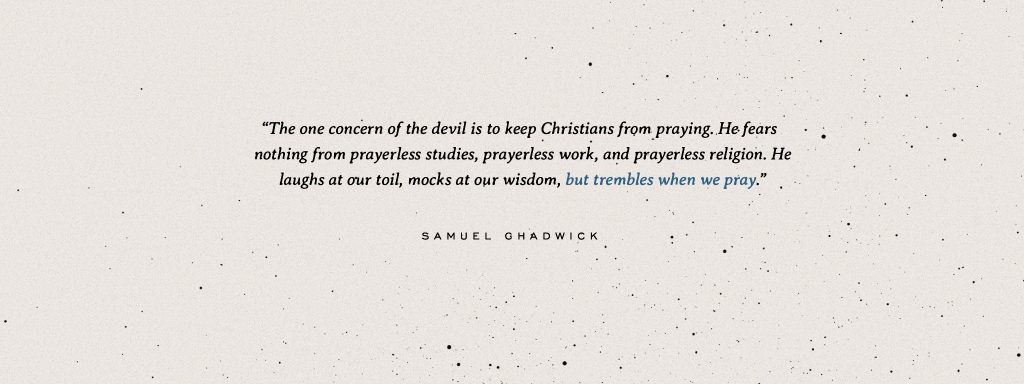
“We are going out and inviting people into a new life and a new community! The good news of God’s peace is that this Gospel of Peace shatters the walls that separate us, restores us to God and unites us to one another!”
— Pastor Alan Amavisca
Learn more about Prayerwalks and Pastor Alan’s ministry here.
Pastor TJ taught us how to put on the Helmet of Salvation in “Holy Helmets,” by first reminding us why we need to protect our minds, our perspectives and our understanding from the devil’s schemes.

The devil uses schemes to overwhelm us, but God gives us the Helmet of Salvation to help us renew our minds and break free from the lies of the enemy.
We put on the Helmet of Salvation by remembering our identity in God the Father by rehearsing the truth of Ephesians 1:1-3: We are adopted sons and daughters through Christ.
We look to Jesus as our example: our Icon. Modeling our lives after the image of Christ.
And to the Holy Spirit as a deposit that guarantees our inheritance until redemption (Eph. 1:14).
When we rehearse these truths over our minds, we are able to illuminate the lies of the enemy that try to steal, kill and destroy our identity and hope.
“You see, God the Father loves you. This love is not based on anything that you have done or have not done, nor is it based on anything you will do. As amazing as it seems, you are vitally important to God just for being you.“
— Pastor TJ Moon
Pastor Janette taught us about the Shield of Faith in “Strengthened & Shielded,” we are not simply defending ourselves against attacks. We are fighting for the redemption and renewal of the whole earth.
Faith is our defense against the flaming arrows of the enemy. We take up the shield of faith when we lead lives worthy of the calling to which we have been called.
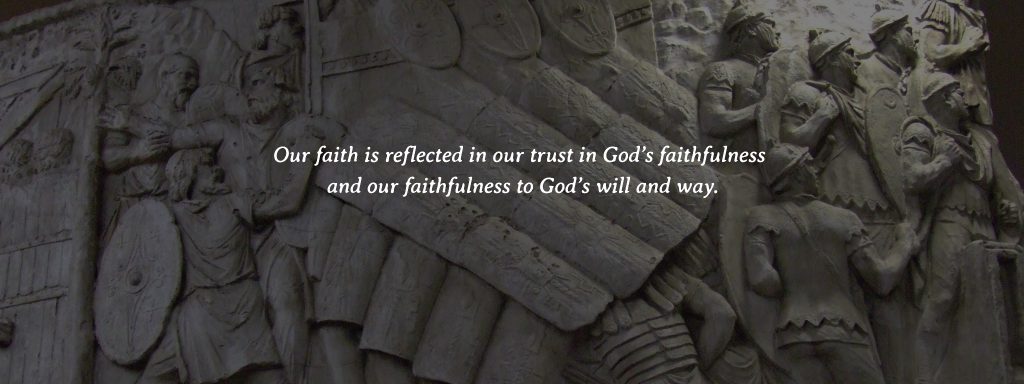
We resist the devil and walk in the will and way of God by being humble, gentle, patient and bearing with one another in love. Living in the light takes initiative. Living in the light means we wake and push against evil by pursuing the will and way of God.
It’s not the final battle we’re responsible to win. The final battle has already been won by God through Christ.
— Pastor Janette
And finally, Pastor Bryan closed out the series with the Sword of the Spirit. Because evil takes shape in the ways we think (ideas), the affections of our hearts (idols), and in systems of our world (institutions), the Sword of the Spirit renews our minds, regenerates our hearts and redirects our bodies.
But the problem is that we don’t use the weapon. We remain weak. Our frustrations come from lack of use, not the power and strength of our foe.
The Sword of the Spirit is the Word of God.
We wield the Sword of the Spirit by memorizing the Word of God and by proclaiming the truth in song and in agreement.
We must read the Word of God not just faithfully but formatively allowing the Spirit to lead and shape us as we get familiar with the Word of God.
When Jesus first began His ministry, the Holy Spirit brought him into the wilderness to be tempted by the enemy. The enemy used parts of scripture to try and tempt Jesus, but Jesus was able to use the Sword of the Spirit because He had memorized and internalized the word.
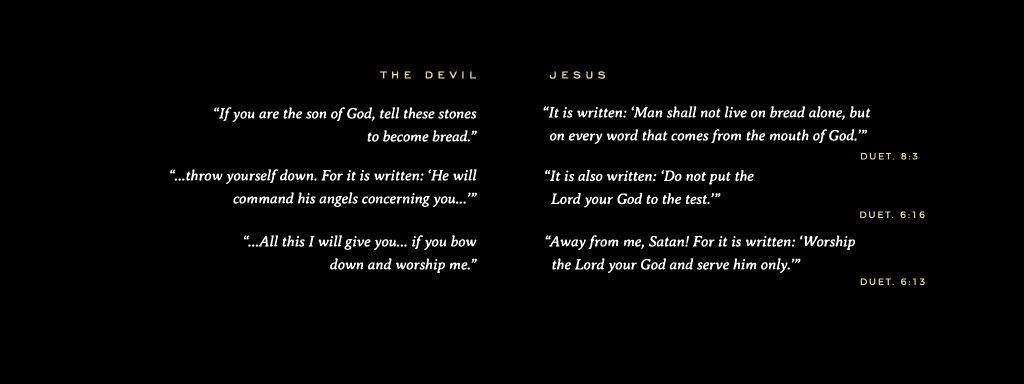
Jesus, our master, knew the Word and was able to combat the enemy with the truth, because it was so deeply ingrained in Him. How much more do we need to have the Word in us?
Jesus starts His ministry with the Word and ends it with the Word of God. In Matthew 4:1-11 Jesus uses the Words to Defeat Satan and starts off his ministry in power. In John 19:30, Jesus ends his ministry by singing the Word of God, Psalm 22!

In a study of Martin Luther King Jr.’s speech, Nancy Duarte explains how his speech was able to move thousands by referencing scripture and songs well-versed in the community.
We, too, must sing in unity and with songs by heart. So that we can get lost in worship because we are so familiar with the songs.
Our worship director, Tim, created a Spotify playlist with all of the songs we use for worship here.
We use the Sword of the Spirit by shouting in agreement with the truth of God’s word. We do this by shouting Amen! or Come on!
“You can’t express what hasn’t been pressed into your heart. The best way to get a grip on your sword is to let it get a grip on you first.”
— Pastor Bryan
“For the word of God is alive and active. Sharper than any double-edged sword, it penetrates even to dividing soul and spirit, joints and marrow; it judges the thoughts and attitudes of the heart.” (Hebrews 4:12 NIV)
Putting on the armor of God every day is not easy, nor does it happen by default. But we must remember to put on the armor that God has gifted us with in order to stay in the fight—because the reality is, we are in the battle, whether we think we’re on the field or not.
And with the help of the Holy Spirit and looking to Jesus, we can partner with what God is doing in the here and now to break the barriers of darkness.
If you’re interested in memorizing Scripture, try these resources that Pastor Bryan mentioned in his sermon “Sword of the Spirit”:
Sword Practice: 7 Psalms in 6 Months (ends at the end of December 2019)
- Psalm 6:1-10
- Psalm 40: 1-17
- Psalm 46: 1-11
- Psalm 124: 1-8
- Psalm 127: 1-5
- Psalm 131: 1-3
- Psalm 134:1-3
- Others: 119:11, 30:4-5, 150:6, 77:11-13, 22:22, 18:2
Other resources to help memorize Scripture: http://theversesproject.com
Apps:
Sword of the Spirit
Faces of EKKO | Diana Singh
As a campus minister, Diana Singh meets with students during a vulnerable and crucial stage in their lives on college and high school campuses all across Los Angeles.
Diana has been a part of Cru—formerly known as Campus Crusade for Christ—since she’s been an undergraduate at the University of Southern California. Last year, she entered into a new role in the ministry after graduation as a campus intern to begin training, evangelizing to and journeying with students in their faith.
Over the past year, as she has been working on forming and equipping students to take charge of the ministries, she has encountered students with Kingdom-minded vision to see God move on their campuses. Through countless meetings and divine appointments, she has been a witness to and proponent of God working in and through colleges in the area.
In this next year, Diana is transitioning into a data and administrative role to advocate for more staff of color in Cru in addition to shepherding and guiding students.
As a member of EKKO, Diana credits much of her journey to the partnership she has had with our church. “Doing ministry has shown me how important it is to be plugged into the greater body of Christ, and I feel His deep care for me in leading me to this tribe to share the burden of my work with,” she said.
“The outpouring of your support, encouragement, curiosity, listening ears, and joy has sustained me in times of doubt and pain as I navigated the new territory of vocational ministry.”
As she shared her experience on stage, her prayer for our church was this:
“Father, I thank you for Ekko as the body of Christ that is seeking to make your name known in this pocket of the world and abroad. I pray that you would bless our congregation with a spirit of evangelism and that you would increase our awareness of the unreached areas in our city, state, and world. I pray that you would continue to increase the faith of this congregation, that through the power of your name, Gospel, and prayers we can partner with the greater body of Christ in a spiritual culture shift in the cities we have come to know and love. I pray for a conviction for the intercession for our city and specific parts of the world that You are calling us to cover with your Spirit and presence. I also pray, Lord, that you would raise up leaders who would spearhead a diversity in evangelistic movements within our tribe – that you would foster creativity and compassion in our hearts and minds as we look beyond the four corners of this church to serve and share your Gospel message with especially marginalized and unseen areas of the spaces we occupy and know. Father, I pray that you would break our hearts for those who don’t know You yet, that there would be a deep yearning in Ekko to see those know you intimately and personally.”
May this be our prayer as we continue to support her prayerfully and financially in her journey serving the students of Los Angeles.
This year, our church gave $2,000 in support of her ministry from the Missions and Outreach fund.
If you’d like to partner financially with Diana, you can do so here.
Here is how we can partner with her through prayer:
- An increase of the Holy Spirit’s presence on campuses around LA that would lead to an increase in students brought to Christ and revival movements on campuses.
- She would hold a constant posture of surrender.
- The Lord would continue to reveal to her how to be an advocate for the marginalized, including students and staff in ministry.
Holy Helmets (TJ Moon)
Blessings and Curses // June

This is part III of Dr. Jessica’s training for us as Ekklesia Leaders. We have had the privilege of spending the last three months with her. I hope you felt equipped not only for your own life, but equipped to better love your Ekklesias.
Whether we are conscious of it or not, we have been given a spiritual legacy from our parents, mentors and those closest to us. A spiritual legacy consists of the blessings that are passed down from generation to generation. This could be anything from a love for God’s word, to love for the church, or wanting to see others come to Christ. Many of us have had grandparents pray that we encounter Jesus and we have—that is a part of our story. In the same way, whether we know it or not, we also leave a spiritual legacy. Some examples:
- Ricky leads children’s worship and has led children in worship for decades. It’s the spiritual legacy he wants to leave the church.
- Pastor TJ used to hold prayer meetings at work. It’s part of the spiritual legacy he’s leaving at his workplace.
What are some of the spiritual blessings you are planting in your community or family?
What can prevent us from passing down a spiritual legacy?
- Transgression is knowingly disobeying. It is knowingly breaking a rule or law.
- Sin is translated as “missing the mark.” It is immature, ignorant action.
- Iniquity is a sin that is “genetic” or passed down from generation to generation unless there is true repentance. Some examples are infidelity, violence, rage, bitterness, poverty or a spirit of poverty, sickness, divorce, unforgiveness, worry, a critical spirit, a domineering spirit, reliance on self.
- Principalities are world views or value systems.
Regional Blessings and Principalities
Regions have distinct principalities that you can identify by observing what people value or how they behave. How do people drive? What is valued in families? Protection? Education? How do people steward money? Each region is also marked by blessing. Examples include hospitality towards others, faith in Christ, financial giving, provision, healing (spiritual or physical).
Try to identify the principalities and blessings in your region.
